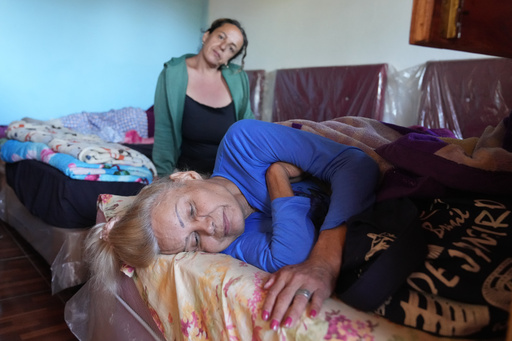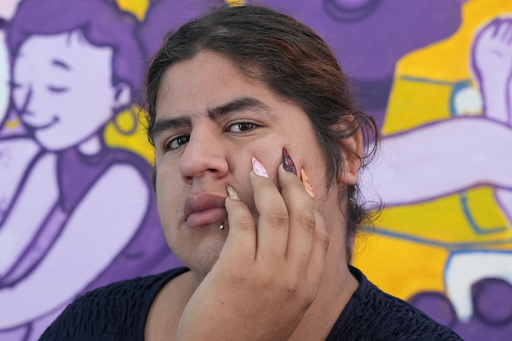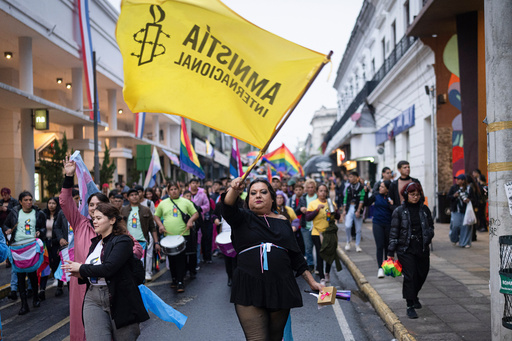For Paraguay’s transgender women, survival often means leaving home
News > Religion News

Audio By Carbonatix
9:06 PM on Monday, September 29
By MARÍA TERESA HERNÁNDEZ
ASUNCIÓN, Paraguay (AP) — In Paraguay, one of the most conservative countries in the Americas, many LGBTQ+ people feel compelled to leave their hometowns due to discrimination, harassment and gender-based violence.
Social rejection and the absence of legal protections take a particular toll on transgender women like Alejandra Mongelós, who first fled her home in 2013 when she was 8 and already identifying as trans. The search for a safe place where she could be herself became an ongoing struggle.
Her life took a turn after a relative molested her. The situation sparked a family quarrel that ended with her mother in prison. Mongelós was then placed in the first of several foster homes where rejection became the norm.
“In one of them, there was this guy who talked to me about God,” said Mongelós, now 20. “He told me: ‘God created you a man, so you have to be a man.’”
Before meeting another trans woman who would take her under her wing at age 13, she says she cycled through nearly 30 foster homes. She would sometimes stay for a month. Other times, not even for a week.
“I kept running away,” she said. “My own caretakers mistreated me.”
Macho attitudes have long fueled discrimination against LGBTQ+ Paraguayans.
Close to 90% of the population is Catholic. And while a repressive dictatorship ended in 1989, the conservative Colorado Party has ruled almost uninterrupted since 1947.
Months before he was elected in 2013, former President Horacio Cartes compared gay people to monkeys and said he would rather shoot himself before his son married a man.
The current president, Santiago Peña, said prior to his election in 2023 that he rejects abortion and Paraguay would defend marriage as the union between a man and a woman.
“As an election cycle begins, the ruling party launches a battle against what it calls ‘gender ideology,’” said attorney Michi Moragas, who specializes in cases involving women’s rights and LGBTQ+ causes. “It’s a way of turning gender issues into an internal enemy.”
That campaign extends to classrooms and encompasses reproductive rights. Comprehensive sex education programs are banned in schools. Curricula overseen by the Catholic Church promote abstinence as the ideal. And the power of the Colorado Party in Congress has prevented discussion on abortion or same-sex marriage, both of which remain forbidden.
“We have a sexist culture where men are men, women are women and nothing else is accepted,” said Yrén Rotela, a trans activist who became a mentor to Mongelós. “That’s why this prejudice endures.”
Mongelós now lives in Casa Diversa, a shelter founded by Rotela in 2018 to protect LGBTQ+ people.
Most beneficiaries migrated within Paraguay in need of safety, work and companionship. Rotela provides them with clothing, meals, training to work as hairdressers and support to overcome addictions.
“I migrated too and was a victim of human trafficking,” said Rotela, who transitioned at age 13 and turned to sex work to sustain herself. “All my scars are the result of the violence I experienced on the streets.”
Activists like her contend that some Paraguayans who spot trans women walking down the street throw glass, liquids and stones at them. Others chase them with machetes or shoot at them.
These attacks generally go unrecorded by the authorities. Most cases are documented only by LGBTQ+ organizations. According to Moragas, trans women feel discouraged to file a police report after being attacked, believing officers won’t take them seriously.
“In theory, the police are supposed to pass on the reports to the prosecutor’s office,” she said. “In practice, they often don’t — or they mistreat the women, mock them, and as a result many decide not to file a complaint.”
Isabel Gamarra, director of another LGBTQ+ organization called Escalando, said she started migrating after her family forced her out when she transitioned at 15.
She became a sex worker for about 10 years. The violence became unbearable and she fled to Argentina, where she lived for three years before returning to Paraguay.
“The killings of trans people were horrific,” she said.
Paraguayan law does not recognize transgender identity or hate crimes. The Constitution forbids discrimination, but what that means in practice — and the legal steps victims should take — remains unclear. Given the legal loophole, a bill is pending in Paraguay’s Congress to establish mechanisms to address cases of discrimination.
To push for its approval and to demand a gender identity law, human rights defenders and members of the community protest each Sept. 30.
The date commemorates the publication of an anonymous letter regarded as a symbolic act of resistance against Gen. Alfredo Stroessner’s regime in 1959.
Days prior to the letter’s publication, radio host Bernardo Aranda was found dead in his home and Stroessner used the case as an excuse to prosecute 108 men identified as homosexual as suspects of the crime.
Nelson Viveros joins the protests each year. In Asunción, where he settled after years of leaving his hometown, he joins the march as his drag persona, Dislexia.
“Nowadays I’m doing fine, but I have to endure constant remarks,” said Viveros, who identifies as a gay man. “Everything I represent is despised and marginalized. People want us to hide.”
His relationship with his family was never as fractured as those of the trans women at Casa Diversa. But it took a while for his parents to fully embrace his identity and relocating became essential for him to feel comfortable.
“I don’t know if I want to wait for things to improve in Paraguay,” said Viveros, who had plans to migrate to the United States but gave up that dream when Donald Trump won the presidency.
“I want to have a better life and feel safe,” he added. “If something ever happens to me, I want to be able to denounce it.”
He, like Rotela and other activists, thinks that Paraguayan trans women face tougher challenges than gay men or lesbians, given that their physical appearance can make them targets for violence.
“I dress like this (in masculine garments) because I take the bus and walk,” he said. “But one shouldn’t alter one’s personality in order to survive.”
Rotela, too, joins the September protest every year and says she won’t stop fighting to secure LGBTQ+ rights.
“We need to start breaking down discrimination, stigma and prejudice,” she said. “Because what’s the point of a law if society won’t respect you?”
“What good is changing our names if we’re still being killed?”
____
Associated Press religion coverage receives support through the AP’s collaboration with The Conversation US, with funding from Lilly Endowment Inc. The AP is solely responsible for this content.










